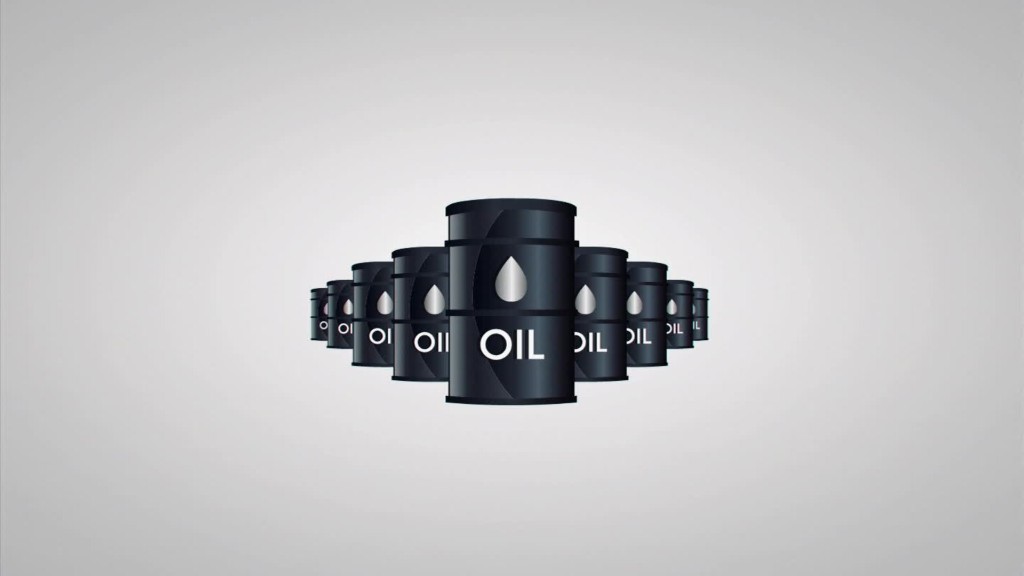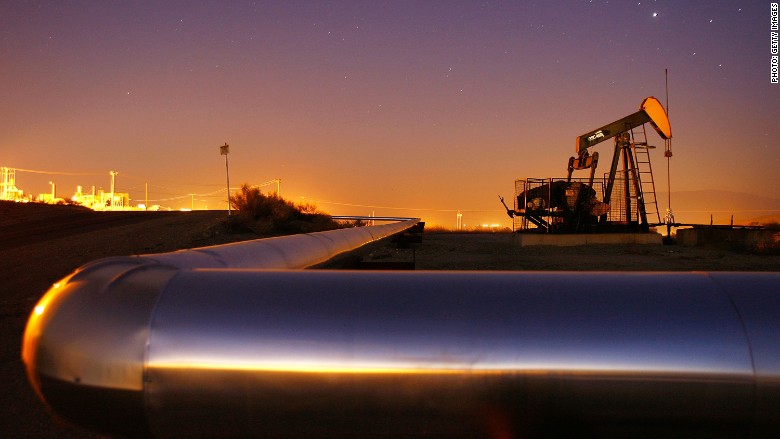
Good news drivers: oil prices have tumbled to the cheapest levels since the Great Recession.
Oil tumbled another 6% on Monday to as low as $37.50 a barrel, its weakest level in almost seven years. A massive supply glut has wiped out two-thirds of oil's value after it peaked at nearly $108 a barrel in June 2014.
The latest oil plunge is weighing on the stock market, with shares of Big Oil companies like Exxon Mobil (XOM) retreating further. The Dow dropped 117 points, with the energy sector its biggest drag. Oil settled at $37.65 a barrel on Monday, the lowest since February 2009.
These moves come after Friday's decision by OPEC not to cut oil output following a contentious six-hour meeting. The oil cartel essentially left production near record highs despite the oversupply problem.
"My head is spinning from the past few days of declines. Sentiment is horrible. It's very bearish," said Mike Wittner, global head of oil research at Societe Generale.
Related: Defaults soar to recession levels, fueled by cheap oil
Too much oil, but OPEC won't cut production
OPEC is gripped by a deep divide between two factions, one led by the top oil producing nation Saudi Arabia and its rich allies in the Gulf that can stomach cheap oil and another led by Nigeria, Venezuela and other countries that need higher prices to boost their economies.
But with Saudi Arabia firmly in control of decision making, a near-term oil recovery doesn't seem likely.
"If you didn't get the message before you probably have by now: The Saudis are really not coming to the rescue," said Wittner.
Oil's crash began last year as the American shale oil boom flooded the market with excess supply. The U.S. has vaulted near the top of the global oil leaderboard, stealing market share from OPEC.
Inventories of oil have swelled to a record of nearly 3 billion barrels, according to the International Energy Agency. It's gotten so bad that a "traffic jam" has emerged in the U.S. Gulf Coast of oil supertankers waiting to be offloaded.
Related: Epic oil glut sparks super tanker 'traffic jams' at sea
Battle for market share
Rather than cut supply to boost prices, OPEC has been aggressively pumping oil in an effort to steal back market share.
U.S. production remains near record-highs, though it has backed off in recent months. Goldman Sachs recently predicted U.S. output will shrink by a modest 65,000 barrels per day in 2016 due to declining drilling rig counts.
Oil prices haven't been helped by the so-so economic environment around the world. The U.S. economy is enjoying just a modest recovery from the Great Recession and many other parts of the world are slowing down.
Related: Iraq is flooding America with lots of oil
Gas prices at the pump could fall further
China's economic slowdown is a big negative for raw materials like oil. Explosive growth in China helped fuel strong demand for oil and even sparked predictions that crude would continue soaring to $200 a barrel or beyond. Crude last broke below $38 a barrel in late August amidst chaos in global financial markets sparked by fears about China.
It's great news for American drivers. Gasoline prices could soon tumble below $2 a gallon for the first time since 2009. The average gallon of gas is currently fetching $2.03, down from $2.68 a year ago, according to AAA.
But cheap oil has been a huge problem for energy companies like Exxon Mobil, Halliburton (HAL) and Chevron (CVX), all of which have suffered steep declines in profits and share prices. The SPDR S&P Oil & Gas Exploration & Production ETF has lost more than 60% of its value since June 2014.



